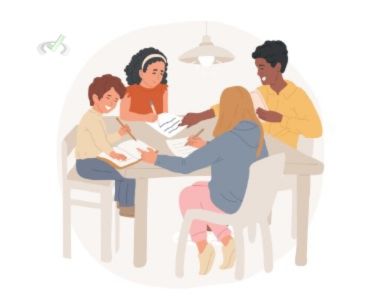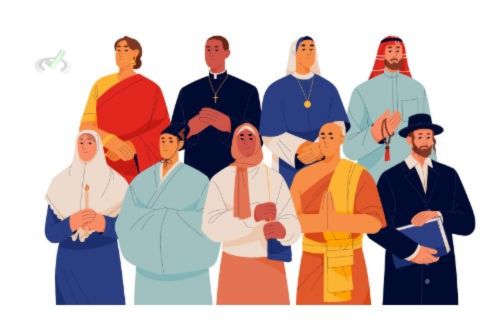Socialization is how individuals learn and adopt the behaviors, values, norms, and roles necessary to function within their society. Various agents of socialization play crucial roles in this process. Let's explore these agents and understand their impact on our lives.
I. Understanding Socialization
Socialization is how we learn to be members of our society. It starts at birth and continues throughout our lives. Socialization helps us understand how to behave, communicate, and interact with others.
Definition of Socialization
Socialization is how individuals learn and internalize their culture's values, beliefs, and norms. Values are the principles we think are important, beliefs are ideas we accept as true, and norms are the rules for how we should behave.
Importance of Socialization
Socialization is essential for:
- Developing Skills: We learn basic skills like walking, talking, and eating, as well as complex skills like critical thinking and problem-solving.
- Building Identity: Socialization shapes our self-concept and identity. It helps us understand who we are and our place in society.
- Maintaining Social Order: By learning societal norms and values, we contribute to the stability and order of our society.
II. Family
The family is the primary agent of socialization. It is the first social group we belong to and significantly impacts our early development.
Role of Family
Families teach us basic behaviors, values, and norms. They provide emotional support and shape our early experiences.
- Basic Behaviors: Families teach us how to speak, eat, and interact with others. For example, parents teach children manners and social etiquette, like saying "please" and "thank you."
- Values and Beliefs: Families instill values and beliefs that shape our worldview. For instance, religious families might teach their children specific religious practices and beliefs, like praying before meals.
- Emotional Support: Families provide love, care, and emotional support. This is crucial for our psychological well-being.
Family Structures
Family structures vary across cultures and societies. Common family structures include:
- Nuclear Family: This type of family consists of parents and their children. It is the most common family structure in many societies.
- Extended Family: Includes relatives like grandparents, aunts, uncles, and cousins. Extended families live together or maintain close relationships.
- Single-Parent Family: This structure consists of one parent raising their children. The different dynamics and challenges involved can impact the socialization process.
- Blended Family: Includes step-parents and step-siblings. This structure requires adaptation to new roles and relationships.
- Same-Sex Parent Family: Consists of two parents of the same gender raising their children. This structure may introduce unique socialization experiences and challenges.
III. Education
Schools are essential agents of socialization. They provide formal education and teach us social skills, values, and norms.

Role of Education
Education helps us develop intellectually and socially. Schools teach academic knowledge, social skills, and cultural norms.
- Academic Knowledge: Schools provide education in math, science, and literature. This knowledge is essential for personal and professional development.
- Social Skills: Schools teach us to interact with peers and authority figures. For example, group projects help us learn teamwork and cooperation.
- Cultural Norms: Schools introduce us to societal norms and values. This includes respect for authority and punctuality.
Hidden Curriculum
The hidden curriculum means informal lessons learned in school. These lessons are not part of the formal curriculum but are essential for socialization.
- Behavioral Expectations: Students learn to follow rules, respect authority, and manage their time.
- Social Roles: Schools reinforce social roles and expectations. For example, they may promote gender roles and societal hierarchies.
IV. Peer Groups
Peer groups are influential agents of socialization, especially during adolescence. They provide a sense of belonging and help us develop our social identity.

Role of Peer Groups
Peer groups offer companionship, support, and a platform for social learning. They influence our behaviors, values, and attitudes.
- Companionship: Peer groups provide friendship and emotional support. This companionship is crucial for social and emotional development.
- Social Learning: We learn behaviors and norms by interacting with our peers. For example, peer groups influence our fashion choices, language, and hobbies.
- Identity Formation: Peer groups help us develop our social identity. We learn to fit in and understand our roles within the group.
Peer Pressure
Peer pressure is the influence exerted by peers to conform to group norms. It can have positive or adverse effects.
- Positive Peer Pressure: Encourages positive behaviors, such as studying hard or participating in sports.
- Negative Peer Pressure: Encourages negative behaviors, such as smoking or engaging in risky activities.
V. Media
The media, including television, the Internet, newspapers, and social media platforms, is a powerful agent of socialization. It influences our perceptions, beliefs, and behaviors.

Role of Media
Media shapes our understanding of the world and influences our attitudes and behaviors.
- Information Dissemination: Media provides news and information about current events. These help us stay informed.
- Cultural Representation: The media portrays cultural norms, values, and stereotypes. It shapes our understanding of different cultures and social roles.
- Entertainment: Media provides entertainment through movies, TV shows, music, and games. This entertainment influences our tastes and preferences.
Media and Socialization
Media is influential in shaping our socialization process.
- Role Models: Media introduces us to role models, such as celebrities and public figures. These role models influence our aspirations and behaviors.
- Social Norms: Media reinforces social norms and expectations. For example, advertisements often promote ideal body images and lifestyles.
- Impact of Technology: With the rise of the internet and social media, people are exposed to global perspectives and communities. This can broaden our understanding and influence our socialization.
VI. Religion
Many people consider religion a significant agent of socialization. It provides moral guidance, community, and a sense of purpose.

Role of Religion
Religion shapes our values, beliefs, and behaviors. It provides a framework for understanding the world and our place in it.
- Moral Guidance: Religion offers moral teachings and ethical guidelines. For example, religious texts often promote virtues like honesty, kindness, and compassion.
- Community: Religion provides a sense of belonging and community. Religious gatherings and rituals strengthen social bonds and support networks.
- Purpose and Meaning: Religion gives people a sense of purpose and meaning in life. It answers existential questions and offers comfort during difficult times.
Religious Institutions
Religious institutions, such as churches, temples, mosques, and synagogues, play a crucial role in socialization.
- Rituals and Practices: Religious institutions teach rituals and practices that reinforce beliefs and values. Prayer, fasting, and ceremonies are common practices.
- Religious Education: Religious institutions provide education about religious doctrines, history, and traditions. This education helps individuals understand and practice their faith.
VII. Bridge/Overlap
Understanding the agents of socialization connects to other important areas in sociology, psychology, and education.
Sociology
Socialization is a fundamental concept in sociology. It helps explain how societies maintain continuity and how individuals learn to participate in social life.
- Social Norms: Socialization helps us understand and conform to social norms. These norms guide our behavior and interactions.
- Social Institutions: Agents of socialization, such as family, education, and religion, are key social institutions. Studying these institutions helps us understand their roles and impacts on society.
Psychology
Socialization influences our psychological development and well-being.
- Identity Formation: Socialization shapes our self-concept and identity. Understanding this process helps explain personality development and self-esteem.
- Behavioral Psychology: Socialization impacts our behaviors and attitudes. Studying socialization helps us understand how behaviors are learned and reinforced.
Education
Socialization is a central aspect of education. Schools are primary agents of socialization that prepare individuals for societal participation.
- Educational Psychology: Studying how socialization occurs in educational settings helps improve teaching methods and student outcomes.
- Civic Education: Schools are crucial in teaching civic values and responsibilities. This prepares individuals to be active and informed citizens.
Cultural Studies
Socialization varies across cultures and influences cultural practices and beliefs.
- Cultural Norms: Different cultures have unique socialization processes that shape behaviors and attitudes. Studying these differences helps us appreciate cultural diversity.
- Cross-Cultural Psychology: Examining how socialization differs across cultures helps us understand universal and culture-specific aspects of human development.
Neuroscience
Socialization affects brain development and cognitive functions.
- Brain Development: Interactions with others influence the development of brain areas involved in social behavior. This includes the prefrontal cortex, which is responsible for decision-making and social interactions.
- Neurotransmitters: Social behaviors can affect the release of neurotransmitters. These are chemicals that transmit brain signals. For example, positive social interactions can increase the release of dopamine. It is associated with feelings of pleasure and reward.
Public Health
Social behaviors impact public health outcomes, such as the spread of diseases and mental health trends.
- Disease Spread: Social interactions can influence how diseases spread within populations. Understanding social behavior helps design effective public health interventions, like vaccination campaigns and quarantine measures.
- Mental Health Trends: Social behaviors like social support and community engagement can affect mental health outcomes. Strong social networks can improve mental health. On the other hand, social isolation can increase the risk of mental illnesses like depression and anxiety.
Anthropology
Social behaviors have evolved differently in various human cultures, impacting their development.
- Cultural Evolution: Different cultures have developed unique social behaviors and norms influencing survival and reproduction. Studying these behaviors helps us understand human diversity and adaptation.
- Rituals and Traditions: Many cultures have rituals and traditions that promote social cohesion and cooperation, such as communal meals and festivals.
VIII. Wrap Up/Key Terms
Let's summarize the key points:
- Socialization: The process by which individuals learn and adopt the behaviors, values, norms, and roles necessary to function within their society.
- Agents of Socialization: Key groups or institutions that influence our socialization process, including family, education, peer groups, media, and religion.
- Family: The primary agent of socialization that shapes our early development and provides emotional support.
- Education: Schools teach academic knowledge, social skills, and cultural norms.
- Peer Groups: Offer companionship, support, and social learning during adolescence.
- Media: Influences our perceptions, beliefs, and behaviors through information dissemination, cultural representation, and entertainment.
- Religion: Provides moral guidance, community, and a sense of purpose.
IX. Practice
Test your understanding with these questions:
Sample Practice Question 1
Which agent of socialization is the primary influence during early childhood?
A. Education
B. Peer Groups
C. Media
D. Family
Ans. D
The family is the primary agent of socialization during early childhood, teaching basic behaviors, values, and norms.
Sample Practice Question 2
What is the hidden curriculum in schools?
A. Formal lessons learned in school
B. Informal lessons learned in school
C. Religious education in school
D. None of the above
Ans. B
The hidden curriculum means informal lessons learned in school, such as behavioral expectations and social roles.








 To help you achieve your goal MCAT score, we take turns hosting these
To help you achieve your goal MCAT score, we take turns hosting these 
